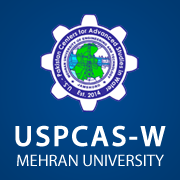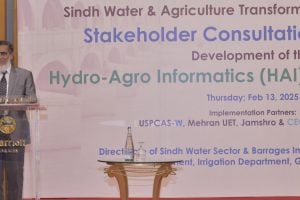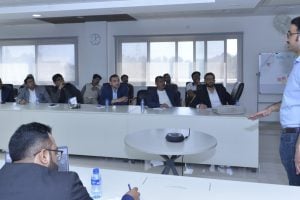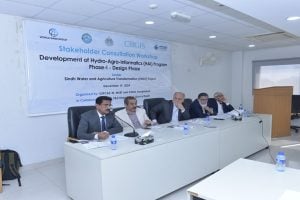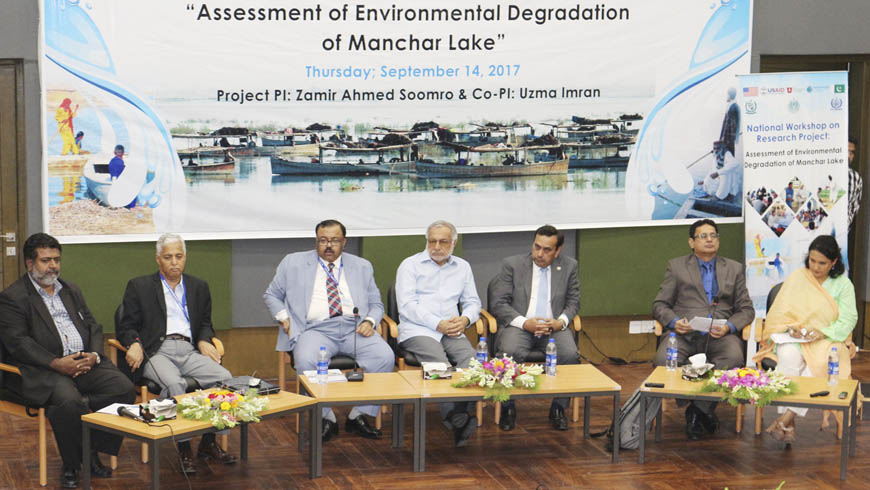
National Workshop on Assessment of Environmental Degradation of Manchar Lake
Senior Sindh Minister for Planning and Development Mir Hazar Khan Bijarani said that Manchar Lake is an economic and cultural asset of Sindh and all the stakeholders must come forward for its rehabilitation. He said that the greed and irresponsible interventions of humans have completely changed the environmental scenario of the Manchar Lake. “The disposal of untreated effluents and other pollutants have dumped into the lake, which has poisoned the lake water”, this he said while speaking in the Nation Workshop on the Assessment of Environmental Degradation of Manchar Lake, a joint research study conducted by U.S. Pakistan Center for Advanced Studies in Water (USPCAS-W) of Mehran University of Engineering and Technology (MUET) Jamshoro and Pakistan Council of Research in Water Resources (PCRWR), Government of Pakistan, held at USPCAS-W MUET.
He said that it is established fact that Manchar Lake, the largest freshwater lake in Asia, has been renowned for its rich flora and fauna, as well as sustaining fishing and agricultural communities through the lake water. In the past decades, he said, water quality deterioration has resulted in the significant reduction in fish supply and lower agricultural yield and the environmental degradation of the Lake compels the fisher folk to look elsewhere for the employment. “Degradation of the ecosystems of the Manchar Lake has been occurring for a long time but the effects have been felt recently”, he added. He also thanked U.S. Agency for International Development (USAID) for establishing water research center at MUET.
He assured that Sindh Government will initiate the new development schemes for the rehabilitation of the lake, whereas in last 50 years, the government has constructed and enlarged the artificial channel called Danister Wah linked it to the mighty river Indus to supply the fresh water. MUET Vice Chancellor Dr. Mohammad Aslam Uqail said that role of the universities has been extended as compared to its past as once the academic institutes were imparting the formal education and used to award the degrees and diplomas, whereas now the universities provide the platform for the healthy discussion and debates to reach out the solutions to the community.
He said that MUET provides the conducive academic and research environment to the students for their professional career and personal growth. Secretary PCRWR Dr. Ashfaq Ahmed briefed about the regional and sub-offices of his respective Institute and its research efforts. He said that salinity is one of the major issues in Sindh whereas the efforts are being taken by PCRWR in collaboration with USPCAS-W to redress the issues on the research based decision support systems. Project Director USPCAS-W Dr. Bakhshal Khan Lashari said that USPCAS-W produces quality graduates and water leaders for seeking the reliable and cost efficient solutions of water related issues of the country.
Regional Director PCRWR Engr. Zamir Ahmed Soomro who was the principal investigator of this study and USPCAS-W Faculty Member Ms. Uzma Imran, the co-investigator of this research project shared the technical and social aspects of their study. They recommended the establishment of Wetland Development Authority and continuity of the research studies including other aspects of the ecosystem of the lake. In the question answer session, Dr. Munir Babar suggested that Dadu Canal may be extended to supply the fresh water to the lake which was appreciated by the stakeholders. Special Secretary Sindh Irrigation Department Engr. Ahmed Junaid suggested that the removal of mercury from the water could be carried out as the study suggested the maximum ingredients of the mercury as metal found in the polluted water. Progressive Grower Syed Mehmood Nawaz Shah, Dr. Altaf Siyal from USPCASW MUET, Dr. Nuzhat Khan of Institute of Oceanography, Mr. Nasir Ahmed Panhwar, Mr. Aziz Ahmed Channa from Environment Engineering MUET, Mr. Moula Bux from Manchar lake, and other participated in the question and answer sessions and shared their opinion.

